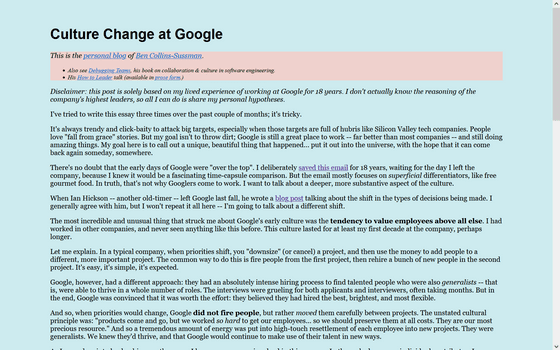A former employee who worked at Google for 18 years posted a long message lamenting that ``Google's culture has changed'' and became a hot topic.

Ben Sussman, a former Google employee who worked at Google for 18 years, was concerned about the gradual changes in how Google prioritized its internal businesses and how to manage limited resources. I expressed my thoughts on the blog.
Writings of sussman@

According to Mr. Sussman, when he first joined Google in 2005, there was a culture that valued employees above all else, and this culture continued for at least 10 years after joining the company.
Sussman says, ``For example, in a typical company, when project priorities change, they may downsize or cancel another project and use that money to add people to another, more important project. This is done by firing people from one project and rehiring a large number of new people for the second project.'' On the other hand, Google did not see this trend, and it seems that a lot of effort was spent to get each employee to work on new projects.
However, the recruitment process was said to be more difficult than that of other companies. In order to find talented people who can play an active role in many jobs, Google conducted several months of interviews and hired only those who were convinced that they were worth the effort. As a result, it appears that people were not laid off even as priorities changed, and that they continued to use talent in new ways.

However, things changed dramatically during the COVID-19 pandemic. What used to be a culture that utilized unlimited abundance has now shifted to a culture of limited resources, no different from a normal company.
Sussman describes a 'culture of limited resources' as 'executives starting to think about financial efficiency like any other company.' Examples include cutting back on lavish company meals, limiting travel budgets, cutting back on office parties and events, and eliminating on-site child care, all of which were once commonplace at Google. It was part of the welfare package.

However, there are not many employees who work for these benefits, so their removal would not have much of an impact. The real problem was that the hiring and promotion process had changed.
According to Sussman, the hiring process has changed from a painstaking process to a simple one, and the promotion process has changed from a competition with yourself to a competition with your colleagues. Additionally, as priorities such as AI projects emerged, large-scale organizational restructuring took place, and Google also implemented employee layoffs. Google was transitioning to a structure similar to that of a normal company.

'Is Google evil? Of course not. Google's leaders are just trying to be fiscally responsible and efficient,' Sussman said. 'It's hard to believe that we now have a culture where employees are valued above all else. Perhaps this is a privilege only possible in an infinitely rich culture.' pointing out.
He added: 'The takeaway here is that we should learn from the example of early Google. When employees feel truly valued, psychological safety, high morale, productivity, and creativity emerge. Early on. employees used to encourage each other to 'fail fast' as a way to innovate, but that's no longer easy in an environment where failure means layoffs. If you're building a company, challenge yourself to value your employees above all else.'
In response to this post, the social site Hacker News said, ``When the company had less than 1,000 employees, it would have been possible to secure talented people, but now that the company has grown to 130,000 people and employs 25,000 people every year. ``Isn't it reasonable that the culture was destined to change , if not get worse?'' and ``Wouldn't profits stabilize if it stopped reckless growth?'' 'We need to change our corporate culture to show investors that we are in a period of crisis and are actually doing something productive.'
Related Posts:
in Posted by log1p_kr







